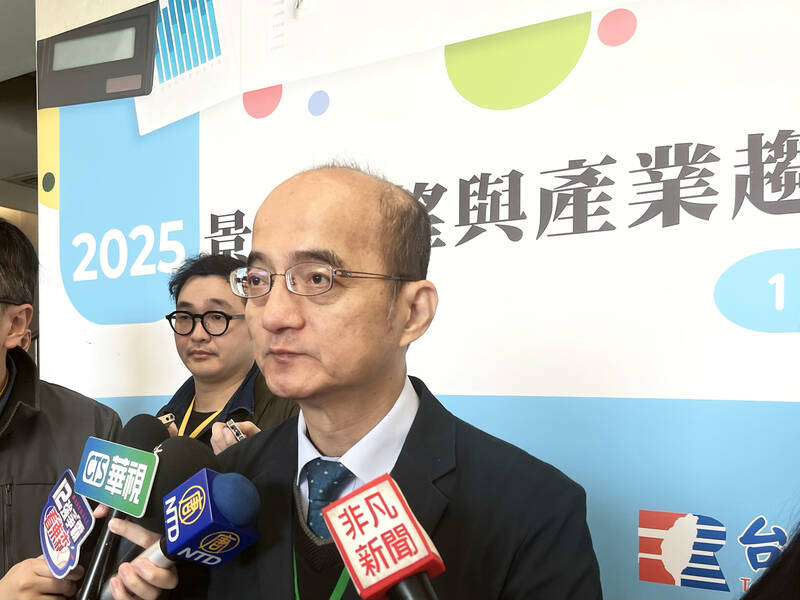The Taiwan Institute of Economic Research (TIER, 台灣經濟研究院) yesterday upgraded its GDP growth forecast for Taiwan this year to 4.03 percent, from the 3.85 percent that it estimated in July, and predicted the economy would grow 3.15 percent next year.
However, the institute warned that US president-elect Donald Trump’s return to the White House creates uncertainty about Taiwan’s foreign trade outlook.
Speaking at a seminar in Taipei, TIER president Chang Chien-yi (張建一) said the key word next year is “trade.”

Photo: Hsu Tzu-ling, Taipei Times
Chang said he felt “cautiously optimistic” about Taiwan’s economy next year.
If Trump were to raise tariffs as he pledged during the campaign, global trade volume would definitely decrease and the world would see a return of higher inflation, he said.
“If the US raises tariffs, would the countries being taxed retaliate, or would other countries impose taxes on each other? It will be several months before the impact on global prices is known,” Chang said.
The institute forecast that Taiwan’s consumer price index would rise 2.23 percent this year and 1.87 percent next year.
Domestic demand in Taiwan has remained stable this year, and exports of information and communications technology (ICT) products, semiconductors and artificial intelligence applications have continued to gain momentum, it said.
However, exports of the old economy sector slumped in the first half of the year, affected by China’s overproduction and the depreciation of the yen, it said.
The good news is that domestic investment has increased significantly since the third quarter, meaning that manufacturers in traditional industries have seen signs of opportunities and started related planning, it added.
As a result, next year’s economic growth is expected to be more comprehensive and evenly distributed between tech and non-tech sectors, the institute said.
The world’s two biggest economies — the US and China — are expected to face headwinds next year in terms of consumption and investment, it said.
However, Europe, Japan and emerging markets, including Southeast Asia, South Asia, Africa and Latin America, would see sustained recovery next year, which would benefit Taiwan’s exports, the institute said.
Facing the return of Trump to the White House, Taiwan must communicate well with the US government, especially on trade issues, as Taiwan’s trade surplus with the US might exceed that with China this year, Chang said.
The government must pay close attention to changes in US policies and propose contingency plans as early as possible, he added.
Taiwan plays an important role in the global ICT industry, but at the same time, Taiwan is also a small nation, Chang said.
If it wants to export to other markets, it must abide by the global order, especially when that order is dominated by a big nation, so thinking about how to communicate with Trump is important, he said.
The institute said Trump’s policies are expected to have an important impact on global political and economic development, which might also affect Taiwan’s overall trade performance.
Those policies could include lowering corporate taxes, raising tariffs, abolishing anti-inflation bills and green energy subsidies, restarting the petrochemical industry, increasing support for Israel, asking allies to increase military spending, and even considering withdrawing from NATO, it said.

The US dollar was trading at NT$29.7 at 10am today on the Taipei Foreign Exchange, as the New Taiwan dollar gained NT$1.364 from the previous close last week. The NT dollar continued to rise today, after surging 3.07 percent on Friday. After opening at NT$30.91, the NT dollar gained more than NT$1 in just 15 minutes, briefly passing the NT$30 mark. Before the US Department of the Treasury's semi-annual currency report came out, expectations that the NT dollar would keep rising were already building. The NT dollar on Friday closed at NT$31.064, up by NT$0.953 — a 3.07 percent single-day gain. Today,

‘SHORT TERM’: The local currency would likely remain strong in the near term, driven by anticipated US trade pressure, capital inflows and expectations of a US Fed rate cut The US dollar is expected to fall below NT$30 in the near term, as traders anticipate increased pressure from Washington for Taiwan to allow the New Taiwan dollar to appreciate, Cathay United Bank (國泰世華銀行) chief economist Lin Chi-chao (林啟超) said. Following a sharp drop in the greenback against the NT dollar on Friday, Lin told the Central News Agency that the local currency is likely to remain strong in the short term, driven in part by market psychology surrounding anticipated US policy pressure. On Friday, the US dollar fell NT$0.953, or 3.07 percent, closing at NT$31.064 — its lowest level since Jan.

The New Taiwan dollar and Taiwanese stocks surged on signs that trade tensions between the world’s top two economies might start easing and as US tech earnings boosted the outlook of the nation’s semiconductor exports. The NT dollar strengthened as much as 3.8 percent versus the US dollar to 30.815, the biggest intraday gain since January 2011, closing at NT$31.064. The benchmark TAIEX jumped 2.73 percent to outperform the region’s equity gauges. Outlook for global trade improved after China said it is assessing possible trade talks with the US, providing a boost for the nation’s currency and shares. As the NT dollar

The Financial Supervisory Commission (FSC) yesterday met with some of the nation’s largest insurance companies as a skyrocketing New Taiwan dollar piles pressure on their hundreds of billions of dollars in US bond investments. The commission has asked some life insurance firms, among the biggest Asian holders of US debt, to discuss how the rapidly strengthening NT dollar has impacted their operations, people familiar with the matter said. The meeting took place as the NT dollar jumped as much as 5 percent yesterday, its biggest intraday gain in more than three decades. The local currency surged as exporters rushed to